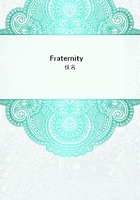
第10章
The exact position occupied by his work in the life of such a man is not too easy to define. He earned an income by it, but he was not dependent on that income. As poet, critic, writer of essays, he had made himself a certain name--not a great name, but enough to swear by. Whether his fastidiousness could have stood the conditions of literary existence without private means was now and then debated by his friends; it could probably have done so better than was supposed, for he sometimes startled those who set him down as a dilettante by a horny way of retiring into his shell for the finish of a piece of work.
Try as he would that morning to keep his thoughts concentrated on his literary labour, they wandered to his conversation with his niece and to the discussion on Mrs. Hughs; the family seamstress, in his wife's studio the day before. Stephen had lingered behind Cecilia and Thyme when they went away after dinner, to deliver a last counsel to his brother at the garden gate.
"Never meddle between man and wife--you know what the lower classes are!"And across the dark garden he had looked back towards the house. One room on the ground-floor alone was lighted. Through its open window the head and shoulders of Mr. Stone could be seen close to a small green reading-lamp. Stephen shook his head, murmuring:
"But, I say, our old friend, eh? 'In those places--in those streets!' It's worse than simple crankiness--the poor old chap is getting almost---""And, touching his forehead lightly with two fingers, he had hurried off with the ever-springy step of one whose regularity habitually controls his imagination.
Pausing a minute amongst the bushes, Hilary too had looked at the lighted window which broke the dark front of his house, and his little moonlight bulldog, peering round his legs, had gazed up also.
Mr. Stone was still standing, pen in hand, presumably deep in thought. His silvered head and beard moved slightly to the efforts of his brain. He came over to the window, and, evidently not seeing his son-in-law, faced out into the night.
In that darkness were all the shapes and lights and shadows of a London night in spring: the trees in dark bloom; the wan yellow of the gas-lamps, pale emblems of the self-consciousness of towns; the clustered shades of the tiny leaves, spilled, purple, on the surface of the road, like bunches of black grapes squeezed down into the earth by the feet of the passers-by. There, too, were shapes of men and women hurrying home, and the great blocked shapes of the houses where they lived. A halo hovered above the City--a high haze of yellow light, dimming the stars. The black, slow figure of a policeman moved noiselessly along the railings opposite.
>From then till eleven o'clock, when he would make himself some cocoa on a little spirit-lamp, the writer of the "Book of Universal Brotherhood" would alternate between his bent posture above his manuscript and his blank consideration of the night....
With a jerk, Hilary came back to his reflections beneath the bust of Socrates.
"Each of us has a shadow in those places--in those streets!"There certainly was a virus in that notion. One must either take it as a jest, like Stephen; or, what must one do? How far was it one's business to identify oneself with other people, especially the helpless--how far to preserve oneself intact--'integer vita'? Hilary was no young person, like his niece or Martin, to whom everything seemed simple; nor was he an old person like their grandfather, for whom life had lost its complications.
And, very conscious of his natural disabilities for a decision on a like, or indeed on any, subject except, perhaps, a point of literary technique, he got up from his writing-table, and, taking his little bulldog, went out. His intention was to visit Mrs. Hughs in Hound Street, and see with his own eyes the state of things. But he had another reason, too, for wishing to go there ....